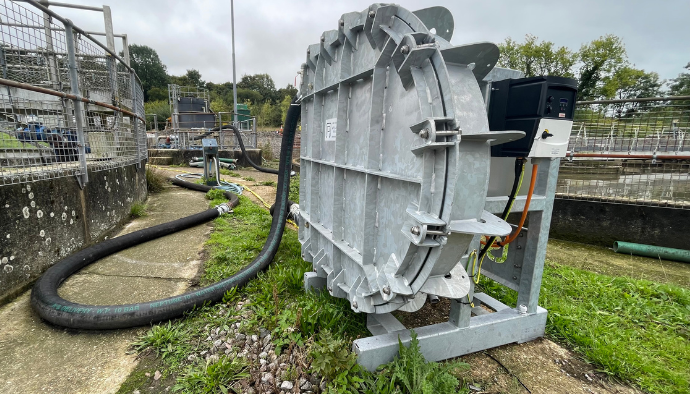Site Reduces Digester Cleaning Costs by 35%
Major WASC Reduces Anaerobic Digestor (AD) Emptying Costs And Cleaning Downtime By Over A Third.
This client, a leading water and wastewater company, treats nearly 10 billion litres of raw sewage waste per week. Their Bioresources team is a key part of their sustainability drive; turning the final sludge into renewable energy and biofertiliser via anaerobic digestion (AD), whilst preventing GHGs (greenhouse gasses) from escaping into the atmosphere.
The Digestor tank is a central component of any AD system, and requires emptying and cleaning periodically to preserve treatment capacity, process efficiency, and safety. An innovative change of technology enabled this company to perform the clear-out process much faster, with significant cost savings and reduction in carbon emissions.
Challenge
One of the most pressing challenges that the AD process brings is grit, rag and solids build-up in the digester tanks. Over time, this reduces the capacity and efficiency of the facilities, causing extra load on the recirculation equipment, increases cost and reduces throughput capacity.
This means digester tanks need routine emptying and de-gritting in order to maintain their design capabilities. Traditionally this is a long, labour-intensive task which involves a specialist vacuum tanker truck. This alternates between vacuuming out the sludge from the bottom of the AD silo, then blowing it back out into a wash-plant dewatering rig.
Background Of The Existing System
During AMP6, the company had invested in a mobile wash-plant and dewatering screen to separate solids, activated sludge, and water.
Although this arrangement reduced road miles by processing as much as possible onsite, instead of tankering it away, it still meant a tanker truck visit for each clean-out.
This tanker truck was equipped with a DISAB Vacloader, a super-powerful rotary piston vacuum / blower that is directly driven by a 9 litre diesel Caterpillar engine. They represented a significant breakthrough when first launched to the market, and there’s still not really a close rival to them when it comes to suction power. They became synonymous with flexibility, have over 90% vacuum efficiency and can reach a whooping 200kWh of power.
The Challenges Of Vacuum Transfer
However, even these vac truck giants experience limitations when emptying AD digesters. In the case of this sewage treatment works, the batch-processing approach of suction-in then blowing out didn’t match the continuous flow optimisation potential of the dewatering unit.
The mismatch between the sludge delivery and dewatering screen capacity meant that the later unit was running without feed for half of the time – and then receiving a batch to cope with. This compromised the treatment capacity and the effectiveness of the washplant. Furthermore, when a blockage occurred, it involved a time-sonsuming manual intervention to clear it.

Solution
Looking to improve their wastewater treatment capacity, efficiency, resilience and sustainability, the Bio-resources lead consulted with Atlantic Pumps about the potential of the LSM pump. These are large industrial peristaltic-type pumps we often recommended for moving thick sludge containing rag and other solids. The pumps provide a controllable flow of sludge that could be tuned to match the wash-plant and dewatering screen’s capacity, while delivering time and energy savings.
Partnering with Atlantic Pumps’ engineering department, an installation of a built-up LSM pump and pipework going directly from digester to the wash-plant was trialled.
The ultimate solution settled on was an LSM-150 (150mm/6″ outlet) pump fitted with lifting hooks, an inverter (VFD) drive, Bauer quick-connect couplings and a 3-phase plug. This provides the in-house assets and ability to empty their AD tanks faster, bringing them back online quicker. The portability enables moving the pump from tank to tank as required, and the ease of operation and reliability aids scheduling and planning.
Results
The new digester emptying system drives efficiency as it requires only a single operator and less than half the time of the previous process, allowing the digester to be back in operation days earlier than before.
Whereas the previous method could only manage 50m3 an hour of sludge emptying, the LSM-based solution is tuned to keep pace with the wash plant and dewatering screen at 130m3 an hour. The constant feed rate optimises the wash-plant and dewatering screen’s processing, and the variable speed controller helps synchronise supply and demand for maximum throughput.
“The LSM pump can handle rope, rag and large solids – up to 100mm on this particular model – meaning it hardly ever gets blocked. Even if it does, the single operator can just flick the pump into reverse until the blockage has cleared” explains Atlantic Pumps Project Manager Ed Smith.
The LSM-150 pump is renown for it’s reliability, longevity, ease of service and low cost and time-saving when it comes to servicing. It’s energy efficient 18kW electric motor delivers up to 130m3/h with 4.5 – 10 bar (max) pressure and can come with a vacuum pump to support suction lifts of up to 8m (the basic pump has a 4m suction lift).
Following successful trials at two of the group’s wastewater works, several other water companies are partnering with Atlantic Pumps to roll out a similar system across their sludge treatment and AD plants during AMP8.
For further information regarding this digestor clearance and de-gritting application or to discuss LSM pumps for your site, please contact Atlantic Pumps Project Lead Deryck Harmer on 07387 248955 or Water Resources Lead Martin Gilman, on 0800 118 2500.


